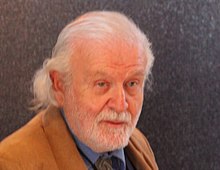S. Fred Singer
| S. Fred Singer | |
|---|---|

2011 photograph
|
|
| Born |
September 27, 1924 Vienna, Austria |
| Nationality | Austrian, American |
| Education | B.E.E electrical engineering (1943) A.M. physics (1944) Ph.D. physics (1948) |
| Alma mater | Ohio State University, Princeton University |
| Occupation | Physicist |
| Organization |
Professor emeritus of environmental science, University of Virginia Founder and president, Science & Environmental Policy Project |
| Known for | Early space research; first director of the U.S. National Weather Satellite Service (1962–1964); involvement in global warming controversy |
| Awards | Honorary doctorate, University of Ohio, 1970; Special Commendation from President Eisenhower for the early design of satellites, 1954; Gold Medal Award for Distinguished Federal Service |
Siegfried Fred Singer (born September 27, 1924) is an Austrian-born American physicist and emeritus professor of environmental science at the University of Virginia. Singer trained as an atmospheric physicist and is known for his work in space research, atmospheric pollution, rocket and satellite technology, his questioning of the link between UV-B and melanoma rates, and that between CFCs and stratospheric ozone loss, his public downplaying of the health risks of passive smoking, and as an advocate for climate change denial. He is the author or editor of several books including Global Effects of Environmental Pollution (1970), The Ocean in Human Affairs (1989), Global Climate Change (1989), The Greenhouse Debate Continued (1992), and Hot Talk, Cold Science (1997). He has also co-authored Unstoppable Global Warming: Every 1,500 Years (2007) with Dennis Avery, and Climate Change Reconsidered (2009) with Craig Idso.
Singer has had a varied career, serving in the armed forces, government, and academia. He designed mines for the U.S. Navy during World War II, before obtaining his Ph.D. in physics from Princeton University in 1948 and working as a scientific liaison officer in the U.S. Embassy in London. He became a leading figure in early space research, was involved in the development of earth observation satellites, and in 1962 established the National Weather Bureau's Satellite Service Center. He was the founding dean of the University of Miami School of Environmental and Planetary Sciences in 1964, and held several government positions, including deputy assistant administrator for the Environmental Protection Agency, and chief scientist for the Department of Transportation. He held a professorship with the University of Virginia from 1971 until 1994, and with George Mason University until 2000.
...
Wikipedia
